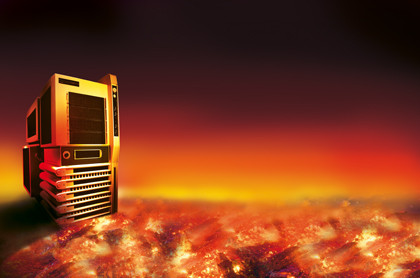Future shock: the next decade in computing
The next 10 years in tech: two scenarios explored
Sign up for breaking news, reviews, opinion, top tech deals, and more.
You are now subscribed
Your newsletter sign-up was successful

But what if the economy never picks up? What if everything goes to hell in a handcart and capitalism collapses?
Does that mean that in ten years' time we'll all be using ten-year-old computers and playing the same games as we are now? No, it does not. There will still be innovation, it will just move in a different direction.
The first casualty will be Microsoft. In ten years' time, that company will be entirely irrelevant to you. Microsoft's current business depends on you buying new PCs with Windows installed. It makes each new version of Windows bigger and more demanding than the last, so your current PC won't run it. That gives you a reason to upgrade, and when you buy a PC, you buy Windows.
In a bull market nobody minds, because buying new things is always fun. But when everyone is skint and the last four versions of Windows have just added 3D rotating toolbars and a new set of desktop wallpapers, you'll know the game is up.
Microsoft will retreat initially to the embedded operating systems of consoles and handhelds, but the long and vainglorious heritage of Windows counts for naught here. We don't care about backward compatibility because each device is self-contained. The huge existing codebase of Windows makes it slow to react to new technologies, and also just plain slow, so it gets outcompeted by more agile, specialised operating systems.
By 2022, the total installed base of Microsoft systems will be less than one per cent of all devices.
Google God

In its place, Google will rise as the new colossus, and at some point in the next ten years, it will quietly change 'don't be evil' from its informal motto to its third directive, behind 'don't get caught' and 'don't forget, we know where you live'.
Sign up for breaking news, reviews, opinion, top tech deals, and more.
Of course, Google makes its money from advertising, and advertising needs us to buy stuff, or the whole thing breaks down. But Google is everywhere now.
The Chrome operating system is only part of it; Google has essentially replaced the domain name system (DNS). It's already quicker to type 'Facebook' into the Google search bar than type 'www.facebook.com' into the address bar.
In ten years there won't be an address bar, just Google, and without the address bar, there is no point in registering domain names. They will still work of course, but you won't use them any more than you use numeric IP addresses now.
Google will sell its own name system that's much cheaper than a dot com and allows spaces, punctuation and mixed case. Better still, because it shows up on the search results, there's no requirement for each name to be unique.
If you register a word or phrase, you'll appear in a separate section on the results page, but anybody else can also register that same phrase and appear there as well.
You can't choose your position on the list; it's determined for each person searching, based on how significant you are to them. This makes it impossible to cybersquat, but of course, if you have to be top, it's easy enough to slightly change the wording of your Googlename.
Googlenames automatically link to your Google+ page by default and every Googlename comes with its own Gmail address. Even if you don't want to register one for your business, there is really no reason not to have one for yourself.
In ten years' time, it will already be quite common for parents to register a Googlename for their child at birth. The simple act of tying your Googlename to your Google+ account will kill Facebook.
There will be a big anti-trust lawsuit about it, but by the time it's all settled, everyone will be used to Google+ anyway and Facebook will never recover.
Gaming IRL

In 2017, 10 years after its existence was confirmed, Blizzard will finally release its next-gen MMO. It will be extremely polished and a lot of fun to play, but it will just be a massively multiplayer FPS set in a science fiction universe, which makes it essentially just Planetside, 15 years after we already had Planetside.
Meanwhile a new game genre will emerge. In the 80s we had the platformer; the 90s were all about RTS, and in the '00s it was the FPS. Now we have the augmented reality or AR game. Historians will trace the birth of this genre back to Zombies, Run!, an iOS and Android game released in 2012. This uses story elements and sound effects to immerse you in an imaginary zombie-infested world, while you're out running in the real world.
Running becomes the input mechanism for the game. You get a mission – to rescue a survivor before the zombies reach him, say – and to do it, you have to go outside and run. Your phone keeps track of how far and how fast you run, and plays in-game audio to let you know how well you're doing and how far behind the zombies are.
Zombies, Run! was a first-generation AR game. The running mechanic was like tapping the spacebar; the game didn't care where you ran, only how much you ran. That's because it was, at its heart, a running program and the developers didn't want to interfere with your existing routes. But later games will add GPS so that objectives appear at specific street intersections, and time-sensitive missions that can only be completed at night.
Your phone camera becomes a scanner to reveal things that exist at specific real-world locations, but which are only visible in the game world. These could be crime scene clues or power-ups, or it could reveal which people are also playing the same game as you – either as allies or enemies.
AR doesn't need to waste developer time and computing resources rendering a virtual world; it repurposes the existing world. This totally redefines the gaming landscape.
Gamers aren't couch-dwelling slobs anymore, they are delusional paranoiacs, running wild in streets. That's not necessarily better, but it's definitely different.
------------------------------------------------------------------------------------------------------
First published in PC Format issue 262
- 1
- 2
Current page: Future computing: The zombie apocalypse
Prev Page Future computing: The shiny Utopia